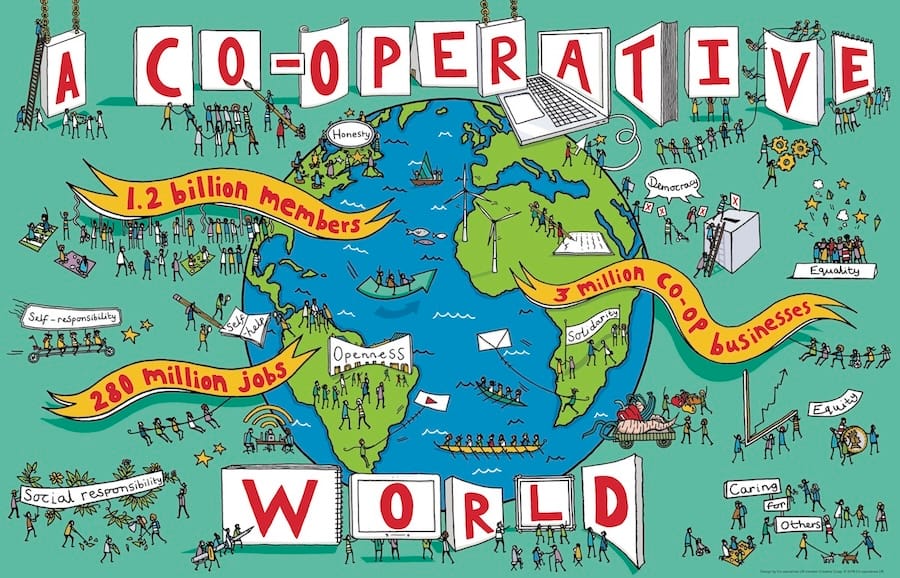Oikos and Co-operatives

Oikos, from the Greek for 'household', is a new term to me, and it's made up of letters arranged in such a way that it refuses to stick in my brain, so I'm having a bit of trouble getting my head around it, but I'm definitely intrigued.
Matt Webb goes into some detail as to why it interests him, because the traditional political compass doesn't seem to work for today's world. (Sidenote – the political compass is another thing that one might assume has been around forever but which is relatively recent, being launched in 2001).
Oikos seems to be the position that it's morally OK to favour blood relatives, or more broadly "people like me". A Polis view is the more traditional "everyone is equal and should be treated equally". Oikos is also called "Mafia logic" and from the perspective of the left it is generally associated with bad things and bad people. Trump is oikos all the way, but it also crops up in more mainstream conservative thought. "There is no such thing [as society]. There are individual men and women and there are families" as Mr Thatcher famously said. And while I might fundamentally disagree with her, she wasn't talking about running a kleptocracy, simply that "people look to themselves first" before thinking about the wider society.
What interests me about this is how it might apply to co-operatives and other non-hierarchical member-run organisations. Are the co-operative values and principles compatible with an oikos view? Matt is at pains to stress oikos is not necessarily a bad thing:
Community is an oikos value! Neighbourhood is an oikos value! Closing the streets to city traffic so kids can play, that's an oikos value! Mutuality and cooperative organisations… traditionally left wing, but elements of oikos there.
I'm not sure. Co-ops are an interesting mix of broadly left-ist ideas of community and equality, but contained within a membership structure which by definition creates a them-and-us dynamic. A co-op can be quite socialist in how it operates, but from what I can see there's no requirement to be. Indeed, there is a Conservative Co-operative movement, set up by Tory MP Jesse Norman who is certainly not some wet centrist, as an adjunct to Cameron's Big Society idea, though it seems to have faded out in 2014. Housing co-operatives, usually associated with affordable housing in the UK, run luxury apartments for the rich in New York, which always blows my mind. I wonder if they subscribe to the co-op values?
Art my co-op, Loaf, we spend a reasonable amount of time thinking about our values, why we do things they way we do. Our primary goal, it's fair to say, is to provide stable long term employment on a living way to our nine members, being ourselves. We have many many other goals, but that's the primary one, because without that we'd be unable to do much else. Are we using an oikos value to create a platform for non-oikos activity? Does that even make sense?
Charity begins at home. Think global, act local.
On a personal level I've never been that bothered about blood family ties. They're important, I guess, but only because they trigger a primal psychological connection and that mostly comes from spending a lot of time with them as a child. Adopted kids have the same thing, so family more about socialisation than genetics, I guess
Even so, the idea that one person is more important than another simply because I have a familial connection to them is woefully subjective and a terrible way to run a society. It might work on a small scale, giving us the bonds we need to survive, but it's objectively meaningless. It's like opinions and beliefs – I have them and I rely on them to navigate, but they don't matter as much as knowledge and wisdom.
Oikos is how you get through the day, but it's a terrible way to run the world.
(Conclusions pending, more pondering required)